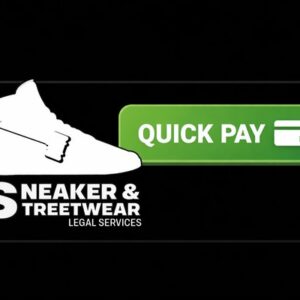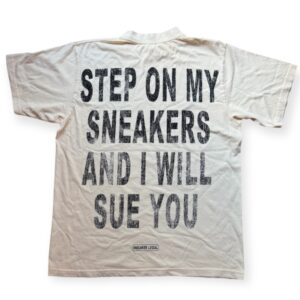
Last night on October 2, 2025, sneaker culture was buzzing after news broke of an alleged “raid” or search and seizure involving Cool Kicks. Cool Kicks is arguably one of the more recognizable resale shops in the USA. The drama unfolded live during a livestream on Whatnot, as the shop abruptly cut the feed, and images circulated online showing law enforcement vehicles and stacks of Nike sneaker boxes outside.
What initially appeared to be speculation has now been confirmed. According to the Los Angeles Sheriff’s Department, Cool Kicks owner Adeel Shams has allegedly been charged with a felony offense by the Los Angeles Police Department’s Bunco/Forgery Division. Shams arrested yesterday and held overnight, until being released on his own recognizance today.
The Bunco-Forgery Division of the Los Angeles Police Department was a unit that investigated fraud, forgery or “bunco” crimes. “Bunco” refers to different types of frauds, scams, trickery, deceit or false pretenses or cons/ confidence schemes. This division also handled forgery, including counterfeit items. Per the LAPD Online, this unit was renamed the Financial Crimes Division in 1997 and later merged to become part of the Commercial Crimes Division. As you see by the documentation below, the term “Bunco” is still used informally today to describe a fraud unit.
The alleged charges highlight a critical truth for sneaker resellers: authenticity and compliance are not optional. They are the foundation of a sustainable business.
Why Authenticity Matters
Sneaker reselling is a billion-dollar industry built largely on trust. Customers expect the products to be genuine when they pay premium prices on the resale market. Knowingly reselling counterfeit sneakers or apparel is obviously illegal and can face serious civil AND criminal charges. Unknowingly selling counterfeits can also be a problem. When a business fails to verify authenticity or take this matter seriously, the consequences can be devastating:
- Criminal exposure: Bunco and forgery charges often stem from fraud, counterfeit activity, or false documentation. What may begin as a “shortcut” in sourcing inventory or “just a one-time thing” can lead to felony prosecution. An individual in China recently received a 3.5 year prison sentence and a 1.6 RMB fine for selling counterfeit DIOR products and services.
- Civil liability: Brands aggressively pursue counterfeit cases, which can result in injunctions, paying a lot of money in damages, and attorney’s fees. In some situations of willful infringement, statutory damages for counterfeiting can cost $2 Million dollars per mark. A judge just approved Louis Vuitton’s default judgement for $584 Million dollars against the Westgate Flea Market in ATL last month. Citing statutory damages in the amount of $2 Million for each of the 292 trademarks that were infringed upon.
- Reputational damage: One viral video or news story can wipe out years of goodwill and trust. In a market as competitive as sneakers, trust is currency, and once lost, it’s really, really, really hard to regain.
Best Practices for Resellers
Whether you’re running a brick-and-mortar store, selling online or selling through platforms like Whatnot, StockX, or eBay, protecting yourself starts with the basics:
- Source transparently
Work only with suppliers you can verify. Keep invoices and proof of purchase to establish a clean and clear paper trail. Most importantly, pay attention to who you are buying from and do your due diligence on them and the products upon purchase. Even your friends or “homie” can mess up and unknowingly have counterfeit products. It happens. Treat every buy the same and protect yourself first. - Have a process to authenticate resale items
Buying directly from a brand and keeping the receipt is awesome. If you can’t do that, use authentication tools and experts. Third-party authentication services can provide both protection and credibility. Education is key, and each brand and silhouette and retro can be different, so study up. Brand’s like to say that only the brand can truly authenticate its own products. Investing in professional trained staff or reliable verification tools can help reduce risks. Remember when StockX ran a CT scan on the “Ruby Red” Wizard of Oz dunks and revealed the hidden numbering showing only 85 pairs existed? A combination of all of the above can be a good standard operating procedure. - Maintain strong contracts
When working with collaborators or suppliers use written agreements. Contracts are important for many reasons and authenticity is a main one. Your contracts should include language on authenticity, representations and warranties, acceptance and inspection of products, indemnification, damages and remedies if counterfeit goods surface, at a minimum. These contracts can protect you in criminal and civil situations and can help prove you purchased or relied on these assurances and intended to purchase authentic sneakers. - Stay compliant with state and federal law
From business licensing to reselling authentic products, resellers must treat their operations like a business, not just a side hustle. Know the laws of the industry you are in. Have a lawyer and other professionals on your team to help in the areas you don’t know.
- Keep your receipts, records, invoices, purchase documents
Keeping your receipts for the items you resell is very important. If you are buying them directly from the brands for retail or from a friend or on eBay, keep your receipts. Your accountant probably tells you to keep them for business purposes and if the IRS comes knocking regardless, and it might be annoying, but them can be important and needed for legal reasons.
Why this matters for sneaker culture
Cool Kicks has long been a hub for sneaker enthusiasts, resellers, and celebrities alike. The charges against Cool Kicks’ owner (and possibly others) are still unfolding, and Mr. Shams is innocent until proven guilty. However, the broader lesson to the sneaker resale community is clear: law enforcement and brands are watching the resale market, and businesses that cut corners are at risk.
What happened in Los Angeles is not just about one store. It is a signal to every reseller that the times of “looking the other way” or trusting the big names or your friends on Twitter over authenticity should be over. Criminal charges, prison, your reputation and a lot of money are at stake.
Why You Need Sneaker Legal on Your Side
Cases like this highlight just how complicated the sneaker industry has become. Between authenticity disputes, fraud allegations, and the ever-changing resale landscape, sneaker professionals and businesses can face serious legal consequences, even when they think they’re playing by the rules.
That’s where Sneaker Legal comes in. We understand the unique challenges of sneaker resellers, collectors, and entrepreneurs. Whether you’re dealing with business disputes, authenticity claims, or need representation in a criminal or civil case tied to sneakers, Sneaker Legal gives you the knowledge, defense, and advocacy you won’t find anywhere else.
At Sneaker Legal, we help resellers navigate these risks before they become existential threats. From drafting airtight contracts to advising on compliance and authentication protocols, our role is to make sure your business operate on solid legal ground so you can rest safely at night.
If you’re a reseller who wants to avoid the mistakes now making headlines, reach out to Sneaker Legal today. Protect your Brand, protect your customers, and protect your future.






